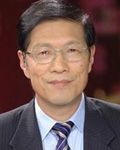|
 Sebastian Harnisch Sebastian Harnisch
(Executive Director of the Institute of Political Sciences at the University of Heidelberg in Germany):
Conventional power transition theories have purported that a dynamic distribution of power will lead to conflict and hegemonic wars. In contrast to that view we hold that hegemonic conflict is not inevitable. We suggest that China's rise will be determined by what goals Chinese elites expect their nation to pursue and what so-called significant others expect from China. While most speakers stress the socializing power of the United States, I consider several other nations, international groupings and the nascent Chinese public opinion to be crucial actors in understanding China's current and future role-taking behavior.
We find thus far China has taken up roles which are consistent with the existing U.S.-dominated international order and that it is likely to do so in the future as it has shown few signs of developing domestic interests that want to challenge the U.S. hegemonic role. In contrast, it may well be that by integrating into the U.S.-led international social order, the Chinese authorities breed compliance constituencies which will demand further integration into an open and liberal international order.

Hao Yufan
(Dean of the Faculty of Social Sciences and Humanities at the University of Macao):
In recent years, Sino-U.S. relations have undergone risks and fluctuations. With its pivot to Asia, the United States is spending more political and diplomatic resources containing China. The mutual suspicions between the two sides, and especially the elites of the two countries, mean that any unexpected incident would have the potential to disrupt the already quite uncertain bilateral relationship.
The United States chooses to believe that China has a well-crafted strategy, and its ultimate purpose is to replace the United States as the hegemonic power of the world. But in fact, China appears to take only a responsive approach in its diplomacy. China's overall strategy for the future is to ensure that it will be able to secure its rise in an increasingly complex and probably worsening external environment. Such an expected rise is not to overtake or to replace the United States on the international stage, but to build a stable and well-off country.
With regard to the United States, China is indeed changing its thinking by carving out a clearer strategy to cope with U.S. pressure or even containment toward China. This new development is certain to give rise to some competition for leadership of the international system between China and the United States, and the future of the international pattern is destined to be shaped by this competition between the top two powers.

Tao Wenzhao
(a senior research fellow with the Institute of American Studies at the Chinese Academy of Social Sciences):
China and the United States have been exploring a new type of power relationship between them since official ties were established in 1979. China benefits from the existing international order and its stable relations with the United States. Meanwhile, the United States is also gaining from the increasing integration of China into the international community. China and the United States are highly interdependent, so although conflicts between the two are possible, they are not inevitable.
In this context, the two countries need to form a new type of relationship, especially when the United States is regarded as declining after the global financial crisis. However, new factors brought forth by globalization have profound effects on relations between the two countries. It is noteworthy that top officials of the United States have maintained that China is not rising at the expense of U.S. interests. Leaders of China and the United States should have sufficient political wisdom to lead the two countries to follow a new path of peaceful coexistence, benign competition and common prosperity.
Email us at: yulintao@bjreview.com | 